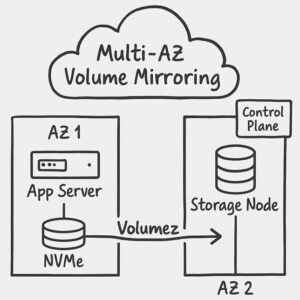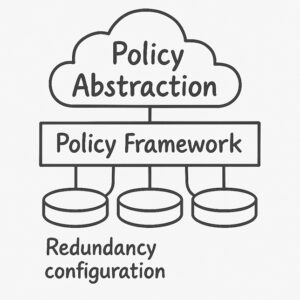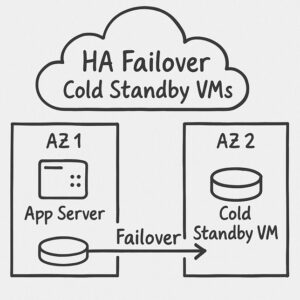VP of Customer Success & Field CTO
Dennis Mulder
Enterprises aiming for High availability (HA) in the cloud face significant hurdles – complex storage architectures, expensive replication software licenses, and the operational overhead of maintaining active/active infrastructure across availability zones. Standard cloud-native options often demand intricate scripting or proprietary appliances, or expensive software to keep data in sync, leading to unpredictable costs, fragile failover procedures, and slower recovery times.
Before the cloud era, organizations relied on Storage Area Networks (SANs), dedicated, high‑speed networks that connect compute servers directly to block storage arrays across two datacenters. SANs offer features such as synchronous mirroring, transparent failover, and centralized management, but require specialized hardware, licensing, and skilled administrators.
Volumez replicates the familiar SAN synchronous mirroring model for multiple Availability Zones (multi-AZ) cloud deployments, without the complexity or expense of on-premises appliances. By treating each cloud availability zone like a node in a virtual SAN, Volumez delivers the same data loss guarantees and rapid failover but entirely based on Linux.
From datacenter SAN to multi-AZ resilience
Traditional HA architecture mirrored data between two physical datacenters. In the cloud, that concept is reborn with Availability Zones. Volumez synchronously mirrors data across two or even three zones, ensuring that even if one zone fails, your data is instantly available from another—no complex scripting or storage appliances needed.
Key benefits:
- Synchronous mirroring across up to three Availability Zones
- No need for traditional replication tools or third-party software
- Resilience equivalent to classic SAN-based HA, delivered as cloud-native software
“Volumez’s cross-zone mirroring let us eliminate costly Oracle ADG and redundant licensing, boosting resilience and saving us over $400K in just three years. They made our Oracle deployments both safer and dramatically more cost-effective,” said Database Vice President, major AdTech company.

Fast failover with cold standby
With Volumez, you don’t need always-on infrastructure in multiple zones. Just deploy a cold standby VM—no database, no services running. When disaster strikes, unmount the volume in one AZ and remount in another. The data is already there, fully in sync. This can be done manually, or automatically via the Volumez REST API. You do have to keep the standby server updated and patched occasionally, but you only pay for the OS and storage software for cloud-native block storage.
Why it works:
- Volumez volumes are always mirrored, ready for instant re-attachment
- Cold standby VMs mean you only pay for one active system
- Failover operations are fully automatable via API
Low RTO and RPO, without the overhead
Recovery Time Objective (RTO) and Recovery Point Objective (RPO) are crucial for mission-critical workloads. Volumez offers RPO (without data loss due to synchronous mirroring) and very low RTO (rapid failover) at a fraction of the traditional cost—without running multiple active systems or purchasing additional replication licenses.
| Metric | Volumez | Traditional X¹ |
| RPO | 0 seconds | 5 seconds |
| RTO | 5-10 minutes | 5-10 minutes |
| Annual Cost Savings | 40% lower | Baseline |
| Max IOPS | Millions (configurable) | 50,000-100,000 |
| Average Single Zone Latency | 0.2-0.4ms | 2 ms |
| Average Multi-Zone Latency | 1-3ms | 3+ ms |
| ¹Traditional X represents legacy active‑active replication solutions requiring additional compute and licensing. | ||
Policy-driven resiliency: Abstract complexity, gain control
Volumez doesn’t require deep storage knowledge. Instead of configuring RAID levels, you choose a policy that reflects your needs – performance, redundancy, and zone failure tolerance. The platform does the rest, mapping your intent into a fully optimized volume layout using local NVMe and standard Linux features.
Policy abstraction highlights:
- Declarative policies replace technical RAID settings
- Performance, resilience, and cost-efficiency are tunable via simple templates
- No need to rearchitect for different clouds or workloads, the API’s and technologies work across the largest clouds (AWS, Azure, and Oracle Cloud)

Simplified operations, no custom HA scripts
Legacy failover solutions often require fragile scripting, clustered databases, and proprietary hardware. Volumez replaces that with resilient, software-defined infrastructure running on your existing VMs. Failover is a simple attach/detach, and the platform handles placement, healing, and performance balancing automatically.
Operational efficiency:
- No clustering tools or shared SANs required
- No overprovisioned infrastructure or idle volumes
- Failover can be close to instant, automated, and resilient to zone-level events

Try it yourself: Experience resilience without the cost
- See Volumez in action: The best way to appreciate the simplicity and power of Volumez’s HA approach is to see it live. We invite you to request a demo and watch how a volume seamlessly mirrors across zones and fails over on demand – no drama, no data loss.
We recently helped a leading technology company retain its 1-hour RPO/RTO targets with ease using a cold-standby configuration, enabling them to cut Oracle Enterprise Edition licensing and support costs by $264K in year one and $59K annually thereafter for a total of $400K+ in 3-year savings per Oracle deployment. Read the blog.
- Pilot with your workloads: Volumez is cloud- and workload-agnostic. Whether you’re running databases, containers in Kubernetes, AI/ML pipelines, or VMs, you can test Volumez with your own workload requirements. Define your performance and resiliency needs and let Volumez provision the optimal setup in minutes. Kick the tires in your environment and see how it maintains uptime even if an AZ disappears.
- Get started: High availability doesn’t have to mean high cost or complexity. Volumez’s policy-driven resilience gives you the peace of mind of dual-datacenter protection without the usual headaches.
Join other forward-thinking teams who have modernized their infrastructure with this approach. Ready to transform your cloud resilience strategy? Contact us for a demo or free trial – and discover how easy HA in the cloud can be.
VP of Customer Success & Field CTO
Dennis Mulder
Dennis Mulder is Vice President of Customer Success and Field CTO at Volumez, where he drives customer onboarding and ensures customers achieve their business goals using innovative composable data infrastructure across major cloud platforms. With over 28 years in technology leadership and 18 years in cloud computing, Dennis previously served as CTO of Microsoft Cloud Technologies in the Netherlands, guiding enterprise clients in maximizing Azure’s potential.
